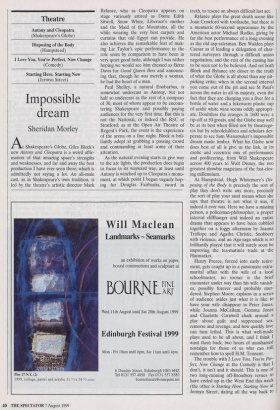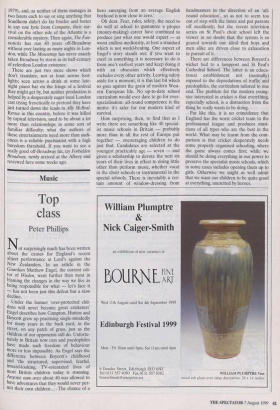Theatre
Antony and Cleopatra (Shakespeare's Globe) Disposing of the Body (Hampstead) I Love You, You're Perfect, Now Change (Comedy) Starting Here, Starting Now (Jermyn Street)
Impossible dream
Sheridan Morley
AShakespeare's Globe, Giles Block's new Antony and Cleopatra is a weird affir- mation of that amazing space's strengths and weaknesses, and far and away the best production I have ever seen there, which is admittedly not saying a lot. An all-male cast, as in Shakespeare's own tradition, is led by the theatre's artistic director Mark Rylance, who as Cleopatra appears on stage variously attired as Dame Edith Sitwell, Snow White, Liberace's mother and the Maid of the Mountains, all the while wearing the very best carpets and curtains that old Egypt can provide. He also achieves the remarkable feat of mak- ing Liz Taylor's epic performance in the role seem by comparison to have been in very quiet good taste, although I was rather hoping we would see him dressed as Bette Davis for Good Queen Bess and announc- ing that, though he was merely a woman, he had the heart of a man.
Paul Shelley, a natural Enobarbus, is somewhat undercast as Antony, but not half so undercast as the rest of a company of 30, most of whom appear to be encoun- tering Shakespeare and possibly paying audiences for the very first time. But this is not the National, or indeed the RSC at Stratford; as at the Open Air Theatre of Regent's Park, the event is the experience of the arena on a fine night. Block is bril- liantly adept at grabbing a passing crowd and commanding at least some of their attention.
As the natural evening starts to give way to the arc lights, the production does begin to focus in its wayward way, at least until Antony is winched up to Cleopatra's monu- ment, at which point I began vaguely hop- ing for Douglas Fairbanks, sword in teeth, to rescue an always difficult last act.
Rylance plays the great death scene like Joan Crawford with toothache, but there is a mesmeric 60-second appearance by the American actor Michael Rudko, giving by far the best performance of a long evening as the old asp-salesman. Ben Walden plays Caesar as if leading a delegation of char- tered surveyors through a difficult union negotiation, and the rest of the casting has to be seen not to be believed. And yet both Block and Rylance are closer to the truth of what the Globe is all about than any nit- picking critic; when in the second interval you come out of the pit and see St Paul's across the water in all its majesty, even the fact that they are charging you a fiver for a bottle of water and a lukewarm plastic cup of acidic white wine seems oddly appropri- ate. Doubtless the oranges in 1600 were a rip-off at 50 groats, and the Globe may well be at its best when filled not by theatrego- ers but by schoolchildren and scholars des- perate to see Sam Wanamaker's impossible dream made timber. What his Globe now does best of all is give us the link, in its exotic and eccentric mix of performance and profiteering, from Will Shakespeare across 400 years to Walt Disney, the two greatest showbiz magicians of the fast-clos- ing millennium.
At Hampstead, Hugh Whitemore's Dis- posing of the Body is precisely the sort of play they don't write any more, precisely the sort of play your aunt means when she says that theatre is not what it was, if indeed it ever was. Here we have a missing person, a policeman-philosopher, a proper interval cliffhanger and indeed an entire drama that appears to have been cobbled together on a foggy afternoon by Joanna Trollope and Agatha Christie. Snobbery with violence, and an Aga-saga which is so brilliantly played that it will surely soon be improving the tea-matinee trade at the Haymarket.
Henry Preece, forced into early retire- ment, gets caught up in a passionate extra- marital affair with the wife of a local schoolmaster; no sooner is the brief encounter under way than his wife vanish- es, possibly forever and probably mur- dered. Stephen Moore explains in a series of audience asides just what it is like to have your wife disappear in Peter Jones, while Joanna McCallum, Gemma Jones and Charlotte Cornwell cluck around a play about guilt and suppressed sex, remorse and revenge, and how quickly love can turn lethal. This is what well-made plays used to be all about, and I think I want them back; two hours of unashamed nostalgia for those of us who can still remember how to spell H.M. Tennent.
The trouble with I Love You, You're Per- fect, Now Change at the Comedy is that I don't, it isn't and it should. This is one of two long-running off-Broadway revues to have ended up in the West End this week (the other is Starting Here, Starting Now at Jermyn Street, dating all the way back to 1979), and, as neither of them manages in two hours each to say or sing anything that Sondheim didn't do far briefer and better in any one lyric from Company, their sur- vival on the other side of the Atlantic is a considerable mystery. Then again, The Fan- tasticks has run 40 years off-Broadway Without ever lasting as many nights in Lon- don, while The Mousetrap has never exactly taken Broadway by storm in its half-century of relentless London existence.
These are just two more shows which don't translate, not at least across foot- lights; seen across a drink at some late- night piano bar on the fringe of a festival they might get by, but neither production is helped by a desperately eager local London cast trying frenetically to pretend they have Just turned down the leads in Ally McBeal. Revue in this country, before it was killed by topical television, used to be about a lot more than relationships in some sort of familiar difficulty; what the authors of these entertainments need more than audi- ences is a reliable psychiatrist with a high boredom threshold. If you want to see a really good off-Broadway hit, try Forbidden Broadway, newly arrived at the Albery and reviewed here some weeks ago.



























































 Previous page
Previous page